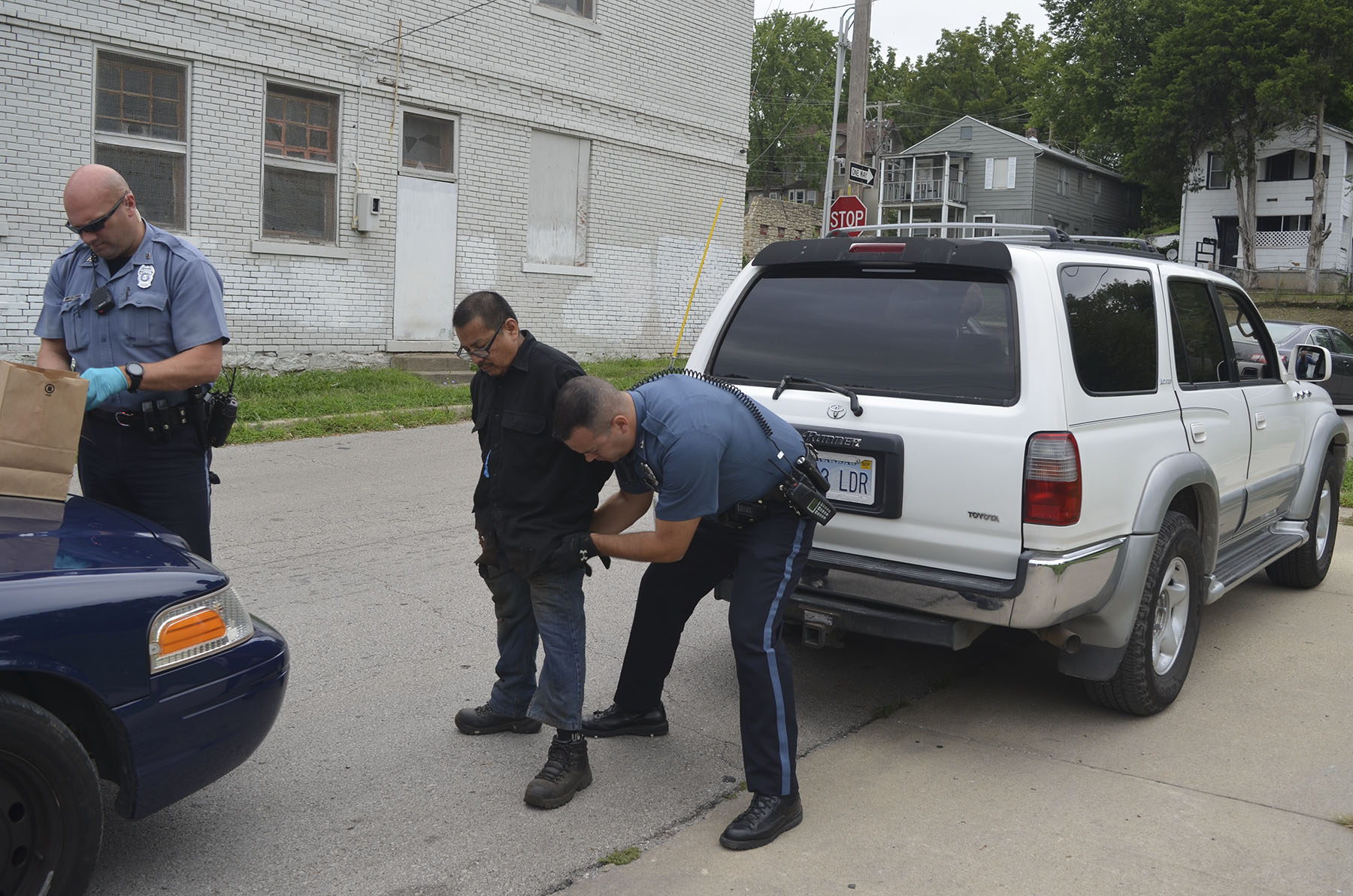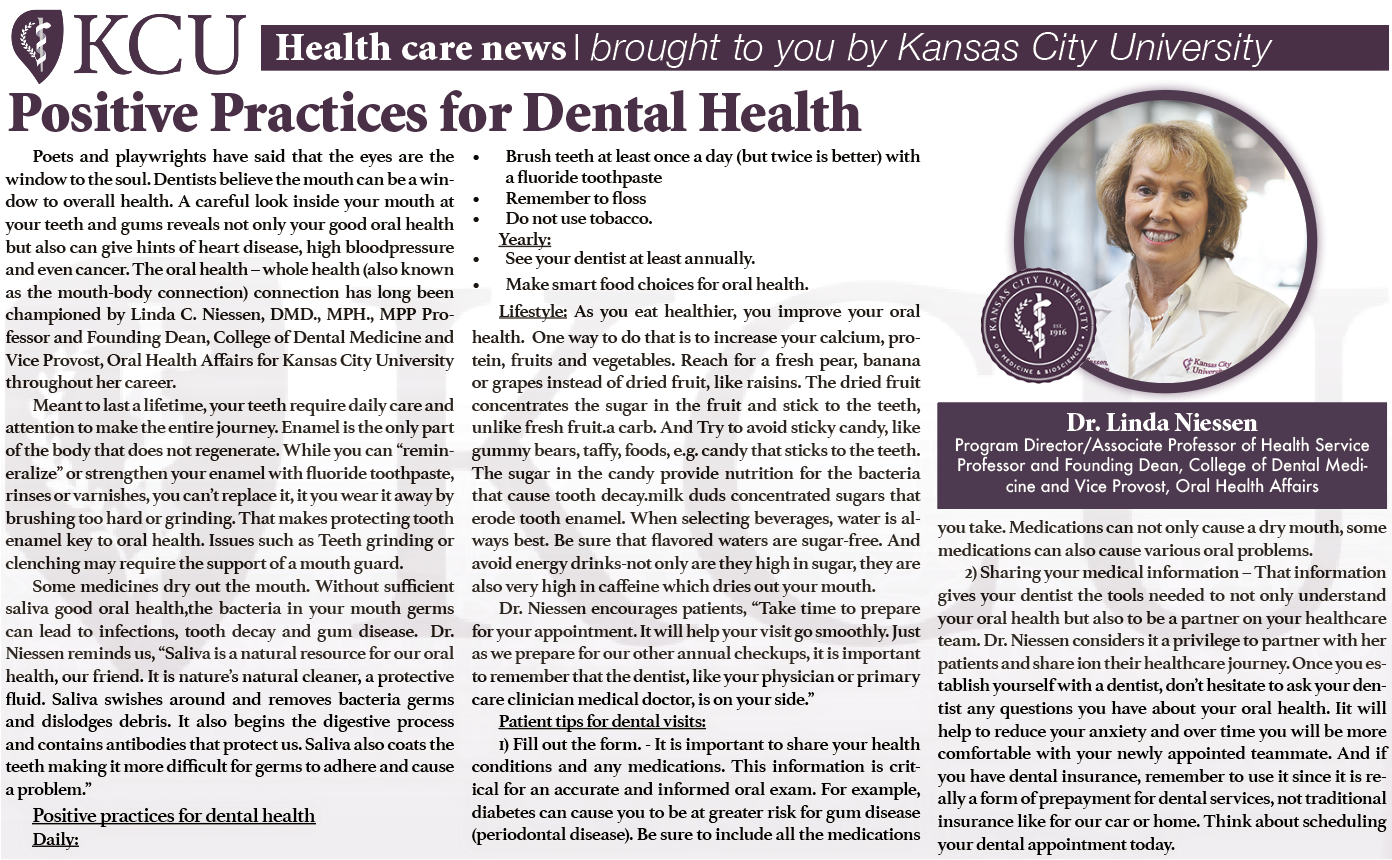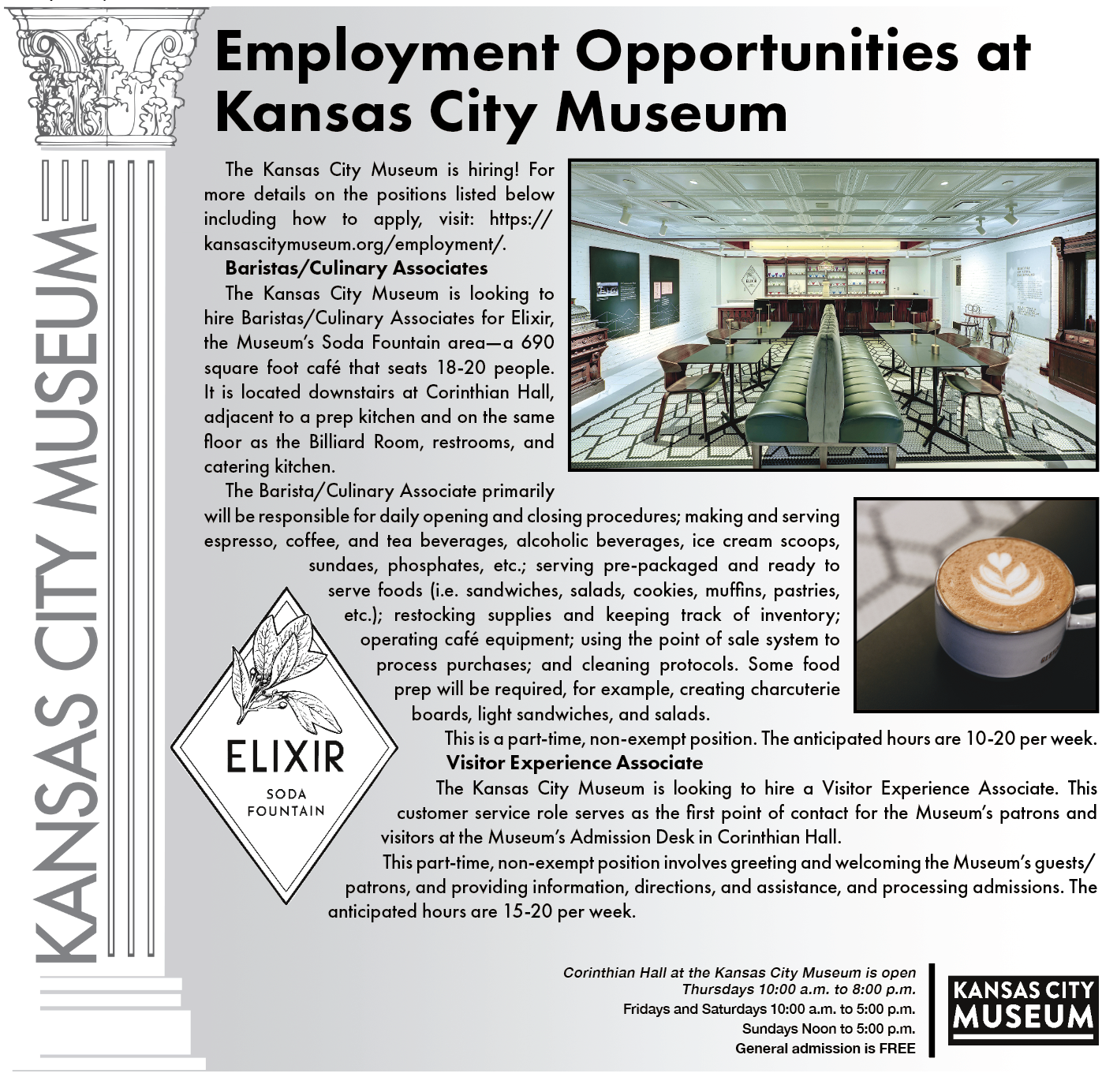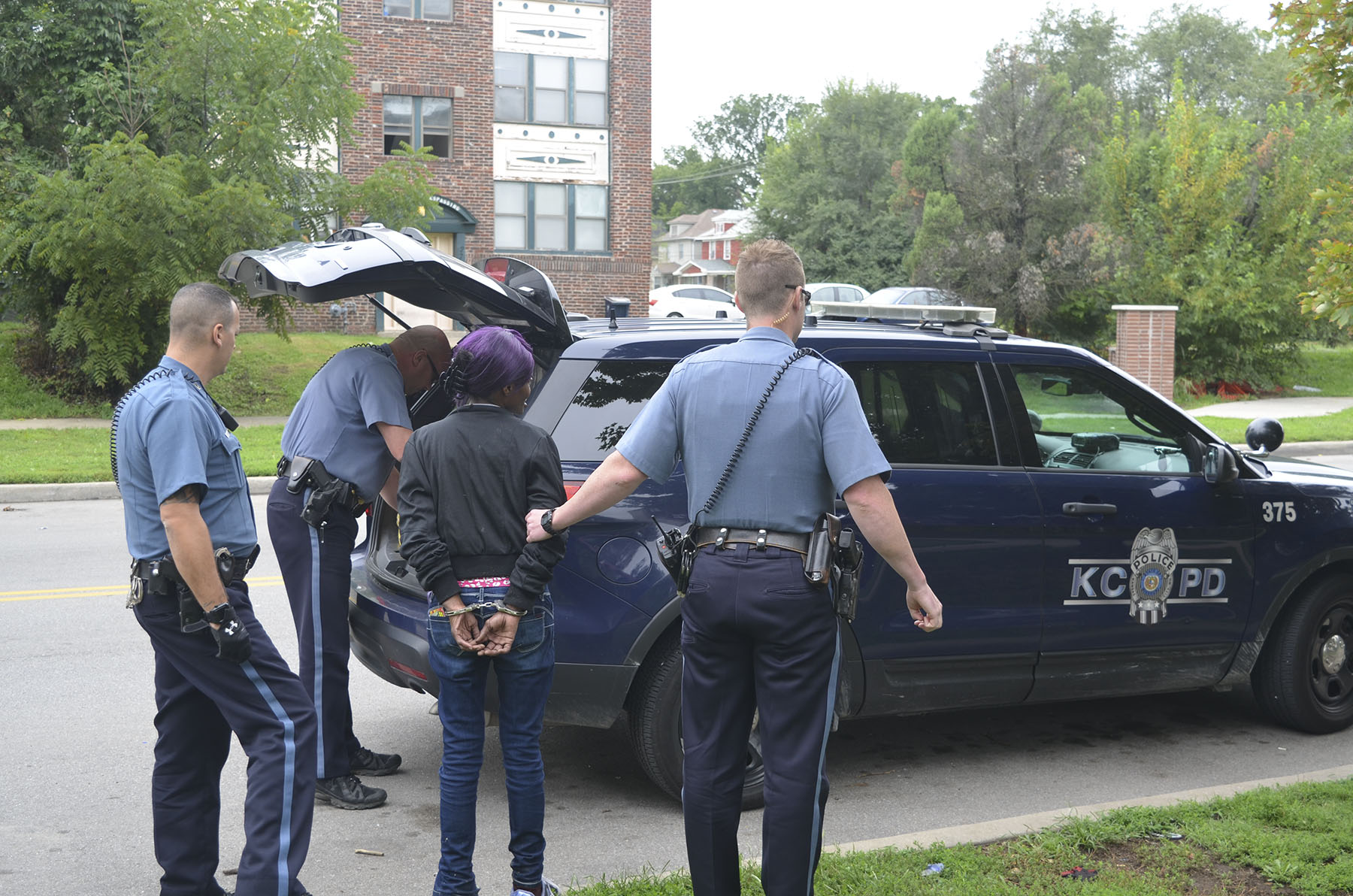
By Paul Thompson
Northeast News
During a day-long prostitution sting on August 29, more than a dozen arrests were made by the Kansas City, Missouri Police Department.
Undercover KCPD officers began the operation by soliciting prostitutes working street corners near the East Patrol Division headquarters, on the city’s east side. Later, officers turned their attention to Independence Avenue in the Historic Northeast, where a decoy undercover officer posed as a prostitute in order to catch solicitors. The operation concluded late in the evening with the arrest of a solicitor, known commonly as a “john,” who was found with a gun, crack cocaine, marijuana, and $2,400 in cash.
The Northeast News was on hand for six hours, riding along with East Patrol Sgt. Terry Owens for the bulk of the afternoon. What follows are real anecdotes from the operation, derived from conversations with not only KCPD officers, but also with many of those arrested during the sting.
The operation was initiated near the intersection of 27th and Benton, when a prostitute with a felony warrant for Dangerous Drugs – along with two city warrants, for Disorderly Conduct and Prostitution – is identified by one of the 16 or so officers involved in the wide-ranging effort.
The arrest itself is swift, clinical. Whenever a plain-clothes officer invites a prostitute into his vehicle, there are multiple unmarked cars with eyes on the car. The drive itself never lasts long; Owens noted that the more time a target has with an undercover officer, the greater the opportunity for something to go wrong. In other words, anything can happen once suspicion leads the target to search for a way out.
With that in mind, the goal is typically to surround the vehicle shortly after a price for services is agreed to. In this first case, Owens and several other members of the team pounce within moments. The woman is promptly searched and loaded into a transport vehicle, allowing the operation to continue nearby, at 29th and Benton.
The second target expresses contrition and disappointment after her arrest. The woman is soft-spoken, but agrees to speak about the circumstances in her life that led her to the front of a squad car. She claims it is her first time engaging in prostitution. Officers pulled out a copy of ‘The Blackbirds’ by Eric Jerome Dickey during their search of her purse; the bookmark inside indicated that she was nearly finished with the 528-page novel.
She talks about needing bus fare, hoping to find employment, and the upcoming class she has to attend. She confides about losing everything in a former apartment beset by asbestos, black mold, and termites.
“I need new shoes,” she says softly.
For the lay individual, prone to empathy, the story is easy to believe. Contrition is persuasive.
“It’s nobody’s fault but my own,” the woman adds.
The officers, though, are more hardened to the narratives spun by the recently apprehended. At one point, Owens suggested that roughly 70% of the stories he hears from arrested individuals are embellishments; desperate tales built upon a kernel of truth. The arresting officer is stern but empathetic; he charges her for the crime of prostitution, but allows her to walk away with a signature bond and a warning to stay off the streets.
“You suck at this, so you need to stop,” the officer warns.
After leaving that scene, Owens takes a phone call from the lawyer of a homicide suspect who stands accused of shooting his six-month-old child. He has been working this angle for some time, hoping to, by proxy, convince the suspect to turn himself in to authorities. The whirlwind requirements of the job continue, even during a special operation.
“Just because I’m out here, doesn’t mean the administrative stuff stops,” Owens says.
The third prostitution target is working within spitting distance of East Patrol headquarters, and news of a “good deal,” as the set-ups are referred to, reverberate up and down the special communications channel established for the operation. Owens raced through an intersection, temporarily flipping on his lights to get a line of sight on the undercover vehicle.
Once the vehicle is pulled over, the woman says that she was only looking for a ride, though the officers at the scene already have confirmation of solicitation. She readily opens up to the social worker at the scene, suggesting that she’s homeless, in need of rehab, and desperate for housing. She would gladly accept social services, she says, and is eager to work. The woman claims to have completed four years of medical school, and touts experience in telemarketing. She, too, is left to walk free on a signature bond.
Soon afterwards, officers apprehend a razor-thin woman in a black jacket, oatmeal-colored sweat shorts and a barely-there tube top. She says that she’s just been displaced from her home after her boyfriend was arrested for domestic violence, and that her kids are currently staying with her brother. She adds that she attempted to check into the Rose Brooks Center, which provides temporary housing for domestic violence victims, but the facility didn’t have any extra beds.
Once upon a time, she had worked as a personal care assistant, a customer service rep, and in hospitality. So why was she selling her body on the street?
“It’s a matter of instability,” she told the Northeast News. “I just didn’t have any other source of income.”
Undoubtedly, drugs were also a factor; the woman was found with a crack pipe in her pocket. After the stop, Owens checks the woman’s story; she had indeed been involved in a domestic violence incident the week prior, though the police narrative indicated that she may have been an active participant in the dispute.
When asked about what typically leads an individual to prostitution, Owens has a quick answer.
“Stop doing drugs,” he said. “Until the American people stop filling their system with drugs…”
He trails off, leaving the sentence to finish itself. Soon afterwards, he shifts gears to contemplate the merits of the sting.
“To be quite honest, it’s a band-aid solution,” Owens says. “It’s good for the citizens, but it’s just temporary. In my opinion, the number one issue we face today in law enforcement is mental health issues.”
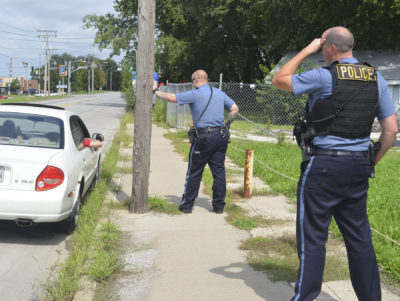
The group breaks for lunch, but when they return to the operation, their attention shifts to Independence Avenue; particularly, the intersection of Independence and Cypress. Their decoy is camped out at this corner, waving at motorists in an effort to entice a john. This process doesn’t take long; perhaps five minutes per attempt; the sheer volume of men attempting to solicit prostitution in broad daylight on Independence Avenue is staggering.
Police camp out in unmarked cars surrounding the decoy, who negotiates prices for sex acts through driver’s side windows. She then directs the drivers to nearby side streets, ostensibly to execute the deed. Instead, the john is surrounded and arrested. In the first arrest made in this fashion, the target parks his car directly behind an unmarked police vehicle.
As the operation proceeds, the officers keep a close watch on unrelated dispatch calls. At one point, Owens hears of an incident near 7th and Jackson, where an individual saw a police car, bailed out of a black Jeep Cherokee, and fled on foot. Owens turns on his lights and races to the scene, invoking a sense of anticipation (combined with a thin layer of fear) that most closely mimics the feeling of riding a twisting roller coaster.
By the time Owens arrives at the scene, the man is already apprehended. Though the vehicle was stolen, the police didn’t know that fact until the man fled. As he sat on the curb, hands cuffed behind his back, officers speculate that he could have been home free if not for that sudden rush of panic.
The next target is a 24-year-old African-American man who grows combative with officers once he realizes his predicament. The man is confident that the stop is a racially-motivated frame job, an accusation that creates a palpable tension in the air.
“Y’all are white men, and I’m a black man,” he says. “I literally pull over for an address, and you all are going to arrest me?”
If the man had been pulled over for running a stop sign, he’d have a point. Here he was, sitting on a curb surrounded by more than a half-dozen white police officers, seeing his car doors opened and his possessions rifled through. His blood boils.
But at least this time, the arrest is justified. Once the scene wraps, one of the officers reveals the negotiation that took place between the arrested man and the undercover decoy. The language is as explicit as it is unnerving.
“$20 for pussy,” the man had suggested. “I don’t want to wear a condom.”
For the uninitiated, the statement leaves a chilling sensation that lingers well after the ride-along concludes. However, the police officers at the scene have heard it all before. They load back into their vehicles, ever steadfast, to continue the operation.
A new mark, after all, is just around the corner.
